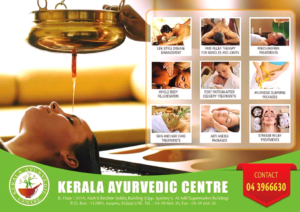Polycystic ovary syndrome (or polycystic ovarian syndrome – PCOS) is a complex hormonal condition. ‘Polycystic’ literally translates as ‘many cysts. This really refers to there being many partially formed follicles on the ovaries, which each contain an egg. These rarely grow to maturity or produce eggs that can be fertilised.
The allopathic approach to this medical condition concentrates on superficially removing the problem rather than addressing the sickness at its source. The poor lifestyle adopted by today’s youth is thought to be the primary cause of PCOS. The problem is triggered by a hormonal imbalance caused by lack of physical activity, which results in numerous cysts.
Ayurveda takes a holistic approach, when it comes to addressing PCOS. The goal of personalised treatment is to go to the base of the problem and restore body equilibrium.
SYMPTOMS OF PCOS

PCOS has become more common as a result of poor dietary habits and a sedentary lifestyle. The following are the most common PCOS side effects:
Irregular menstruation refers to irregular periods, such as missing period dates by a few days or going months without a period. During their periods, some individuals endure excessive bleeding.
Hair growth on the face, arms, chest, and abdomen (hirsutism) is reported in over 70% of women with PCOS.
Acne Issue should ideally disappear once adolescence is passed. Acne can occur in patients with PCOS, particularly on the back, chest, and face.
Increased Body Weight: One of the most common side effects of PCOS is becoming overweight or obese. Worst of all, losing weight is more difficult than gaining it.
Acanthosis Nigricans is a dark discoloration in body folds and creases, particularly in the folds of the neck, armpits, under the breasts, and genital. It is frequently observed in PCOS patients.
Multiple Cysts: Cysts are little pockets of fluid that grow in the ovaries and are not eliminated during the menstrual cycle. They form a chain and stay in the uterus for long periods of time.
PCOS patients may notice thinning hairlines and reduced hair volume. Some people even have hair loss in sections, resulting in bald regions.
Infertility is defined as a decline in the frequency or quality of conception
TREATMENT OF PCOS WITH AYURVEDA
- Herbs like, Dandelion, Blue Cohosh, Tulsi, Neem, Fenugreek, Castor oil, Sesame seeds, and Flax seeds can help with the hormonal imbalance and related symptoms of PCOS (infertility, diabetes, to name a few). In addition to the usage of herbs, there are a few pranayama’s that can help with PCOS by relaxing the entire body and restoring the dosha balance.
- Ayurvedic herbal treatments such as Trikatu, Guggul, Triphala, Kanchanar, Dashamool, and others have repeatedly shown efficacy in reducing ovarian volume in PCOS patients. Ayurvedic herbs like Shatapushpa and Shatavari are used in herbal treatments to assist naturally increase eggs and split follicles.
- Nasya, Virechana (part of panchakarma Detoxification), Shirodhara, and Uttar Basti, as well as lifestyle and nutrition changes, are recommended in Ayurvedic treatment for PCOS.
- , commonly known as Indian ginseng or winter cherry, is a herb. that manages patients with chronic stress, it can help balance cortisol levels and alleviate stress and PCOS symptoms.
- Cinnamon which comes from the bark of the cinnamon tree, is more than simply a spice for baking: it has been shown in a small 2019 study to improve insulin resistance markers in PCOS patients. Cinnamon may help women with PCOS regulate their menstrual cycles.
- Turmeric, Curcumin, the active ingredient in turmeric, provides it its yellow colour. Curcumin showed promise as an anti-inflammatory drug and as a means to treat PCOS.
- Panchakarma is extremely beneficial to women with PCOS. It is an Ayurvedic treatment that includes oil massages, oil baths (Oleation), and Fomentation (a procedure in which the body suffers severe sweating) to remove toxins from the body (detoxification).
- Foods having a high glycaemic index should be avoided. Instead, choose low-glycaemic-index foods like grapefruits, cauliflower, peaches, onions, apples, and other comparable dietary options.
- Patients who are severely obese should make an effort to lose weight.
Kerala Ayurveda Centre Dubai promotes total healing from PCOS symptoms and rejuvenates the body, mind, and spirit to make you feel better. We give experienced doctors and staff for all-round care and support to the patients, in addition to the finest medical infrastructure and medical utilities. One of the best ayurvedic therapies for PCOS in Dubai is Kerala Ayurveda Centre Dubai.





